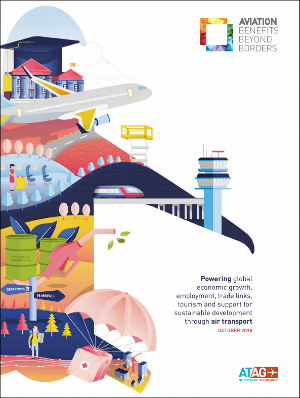Ungated Post | 13 Nov 2018
Benefits Beyond Borders

Oxford Economics has once again collaborated with the Air Transport Action Group (ATAG) to provide the most comprehensive estimate of the the value of the world’s aviation sector.
We use a wide range of data, from industry and governments, to estimate the economic impact of the aviation sector in 63 individual countries, 6 regions, and 7 country groups. We estimate that in 2016, the air transport sector and the tourism it facilitates supported a $2.7 trillion contribution to global GDP and 65.5 million jobs.
This year’s report has a special emphasis on the importance and value of an open and interconnected world. The benefits that the aviation sector facilitates depend crucially on the freedom of people and goods to move across borders, facilitating business meetings, knowledge sharing, trade, and investment. As part of this theme, we present two scenarios for the aviation sector’s economic impact over the next 20 years: one where the world continues to become more open and interlinked, and one in which that process is interrupted or reversed.
Oxford Economics’ team is expert at applying advanced economic tools that provide valuable insights into today’s most pressing business, financial, and policy issues.
To find out more about our capabilities, contact:
EMEA
Sam Moore
+44 (0)207 803 1415
Email
Americas
Hamilton Galloway
+1 (646) 503 3068
Email
Asia
Peter Suomi
+65 6829 7198
Email
Related Services

Post
The economic impact of abandoning the WTO
Oxford Economics have been commissioned by the International Chamber of Commerce (ICC) to provide an independent assessment of the economic impact of WTO dissolution. This report details our findings and the assumptions underpinning our analysis.
Find Out More
Post
The economic impact of the sports activities of public service media
This study shows how the sports activities of public service media supported €4.5 billion of GDP and 57,000 jobs across 31 European countries in 2022, taking direct, indirect (supply chain), and induced (wage-funded expenditure) impacts into account. The report also highlights wider economic benefits of public service media sports coverage, such as the way in which it leverages sponsorship income for sports bodies.
Find Out More
Post
Global Trade Education: The role of private philanthropy
Global trade can amplify economic development and poverty alleviation. Capable leaders are required to put in place enabling conditions for trade, but currently these skills are underprovided in developing countries. For philanthropists, investing in trade leadership talent through graduate-level scholarships is an opportunity to make meaningful contributions that can multiply and sustain global economic development.
Find Out More